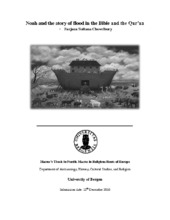| dc.description.abstract | Noah's flood is one of the most ancient religious stories of the world. The story is told and retold within the Judeo-Christian and Islamic traditions to depict some of the core notions of these beliefs. Like many other stories in the Bible and the Qur’an, the flood story has similarities as well as significant differences. Comparative studies of the flood stories on thematic differences derived from narratives are limited in number. This thesis is constructed on the comparisons of the stories narrated in the original texts in the Bible and the Qur’an. At first, I have summarised the narratives, which is followed by an evaluation of the contexts of the flood stories depending on the narratives. Through a critical analysis, this thesis inquiries the image of the deity in the Bible and the Qur’an depicted in these two flood stories. In addition, this thesis highlights the way the stories have been interpreted and used by theologians in these two different religious dominions.
The research concludes that in the Bible, Noah's flood is a story to warn the corrupt and inspire the righteous. On the other hand, Noah's flood in the Qur’an cautions the unfaithful to God and the gruesome consequence of unfaithfulness. In biblical narratives, God decided to bring the flood Himself and also became sorry afterwards for His action. In the Qur’an, the flood is a response to Noah's prayer to God. This study shows that two flood stories portray the image of God in two different ways, The biblical God has been humanized (suitable for human to perceive) to some extent having the attributes of a human-like understanding of mistakes, a strive for correction (repentance), and a willingness to build covenant (agreement) with all His creatures (e.g. Noahic covenant). The God in the Qur’an isolates Himself from all human-like attributes; He is inimitable and all-knowing, He seeks for loyalty and submission of one’s entire self to Him. He sets punishment as a recompense for unfaithfulness. The Qur’anic covenant implies obeying the one and only God, but unlike the biblical God, the Qur’anic God is not obliged to do anything like an agreement. The flood story got a symbolic transmission with the rise of Christianity. The biblical flood story shaped up in an image of baptism. In general, Islamic scholars are not interested in symbolic meanings of the flood story. | en_US |
